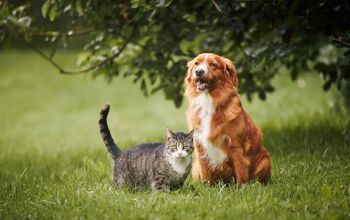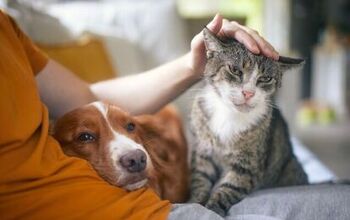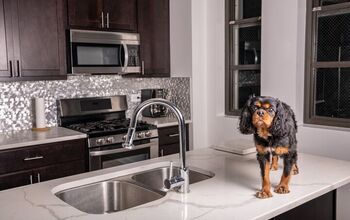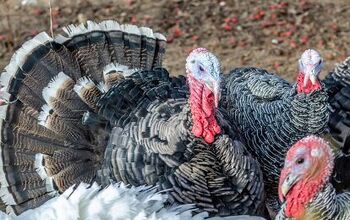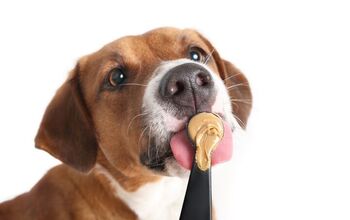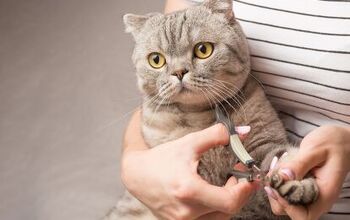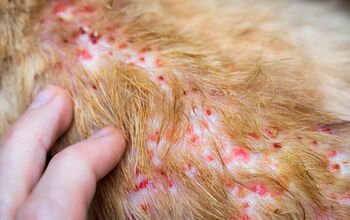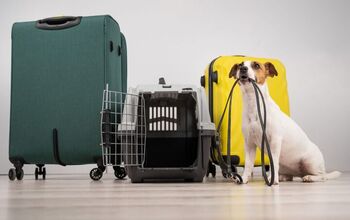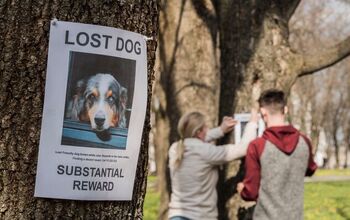10 Unexpected Expenses for First Time Dog Owners to Plan For

You’re ready, right? You’ve got the dog bed. All those cute toys, and that smart treat dispenser that lets you shoot your new buddy a treat when you’re not around. But there are some additional expenses that you may not have anticipated when you fell in love with that cute little fuzz-ball. You think I’m talking about those darling winter coats and fun accessories, don’t you? How cute is that! No, I’m talking about the not-so-fun expenditures that you likely thought about for a nano-second, then decided to deal with if and when they ever cropped up. Trust me, they’ll crop up. And while I never regret a single expense related to the well-being of my pets, I sure wish I’d had the foresight to budget for them.
So, let’s take a peek at some of those areas where you could quite possibly be splashing out some serious cash before you even begin pricing out those cute jackets and booties.
If your new pooch happens to suffer from separation anxiety when you’re away at work, you may want to check into a pet sitter. You see if left unchecked, your dog’s angst can result in destructive behaviors including incessant barking, chewing, and urinating. You’ll want someone who can come by and check on him a couple of times a day to make sure he’s okay. A familiar face that can let him out of his crate for a potty break, play with him, and generally make him feel a little less lonely. This type of help is fairly easy to arrange, but it comes at a price depending on how often you need them to visit, what you want them to cover off, and how long you’d like them to spend with your pet.
Dog Walkers
For those that work from home, you likely don’t need a pet sitter to come in and feed or play with your dog. But there may be times throughout the day when it’s clear he wants to go for a walk and you just want to finish that complex financial report for your boss. What to do? You’re going to want to hire a reliable dog-walker to swing by and take a restless pup off your hands for an hour or so. Dog walkers are great. They’ll take your pet out for a one-on-one walk if that’s what you prefer, or welcome him into a group of other pooches that get to enjoy the local leash-free park. A good walker can also help teach him manners and socialization skills. Again, just a little extra service that you probably hadn’t thought about.
As a new pet owner, you will have spent time sourcing a local vet you’re comfortable working with and learning more about the vaccinations your pet will need. But weren’t you surprised to learn that in addition to his annual rabies shot, there are a host of other treatments he should receive? Such as those special topical treatments that protect him from fleas and ticks? Or the shots that can protect him from all those other parasites that can lurk in standing water, contaminated soil, or by just getting a sloppy wet kiss from another dog. They’re all important but can easily double what you expected to pay for his yearly vaccinations.
Pet Insurance
Depending on the age and breed of your dog, it may make sense to check into getting pet insurance to cover any illness your pooch may be prone to down the line, or worst-case scenario, serious injury. But before you spring for this type of insurance, be sure to shop around to ensure you have the coverage that meets your needs. And know that it doesn’t cover your annual vet visits and it won’t pay-out for any pre-existing condition. This last one means that unless you’re insuring a puppy or young dog, it won’t be worth your while to splash out for monthly premiums – which can be steep. And just like health insurance for humans, there is a deductible that you’ll have to cover out of your own pocket, and a maximum amount they’ll pay-out.
Cost of Premium Foods
Seasoned pet owners know that arriving at the ideal brand and formula of food for your dog can be an exercise in trial and error. You want a top-quality product, but it has to be something that he enjoys. You also need to know that what he’s being fed is suitable for his age, breed, and activity level. And that may mean you can’t grab just any bag of kibble off the supermarket shelf. For dogs like mine, with sensitive digestive systems, it has to be a specific, low-fat variety or it goes right through them. And if your pet leans towards food allergies, you may even need to have your vet make a recommendation. In situations like mine, it’s a brand and formula that can only be purchased through a vet’s office (believe me, I’ve tried other formulas and they don’t work). Costs mount up, but it’s worth every penny just to know he’s eating the best foods for him.
Training
I’ll bet you thought you’d do this yourself, didn’t you? If you’re a first-time dog owner and are feeling pumped about spending this one-on-one time with your pooch, you may first want to check into how receptive your particular breed is at picking up on commands. Many dog breeds are described as willful, stubborn, or independent and that means they’ll need a strong trainer to take control and gain their obedience. Others are easily distracted and need someone with exceptional patience who can change up their routine to keep them engaged. And then there are the breeds that are all about the rewards and praise, but how do you encourage without over-indulging. Know your dog and accept when it’s best to spring for a professional trainer to get the results you want.
Hotel Stays
If you can’t imagine traveling without your pet, it’s good to know that there is a wide range of top-brand hotels and motels that will allow you to bring him with you. They offer rooms dedicated to pet-owners, will often provide a pet menu to keep your pooch satisfied during his stay, and some upscale brands even offer dog-walking services. But everything comes at a price, including having Rover room in with you. Additional room fees can range between $25 to $50 per dog per night. Some brands have a weight limit, and all will require a security deposit – typically used as a deep-cleaning fee after you depart should your pet stain or damage the room. Further, many hotels will not permit you to leave your pet unattended in case he begins barking and disturbs other guests. Just something to consider including in next year’s vacation budget.
Licenses
Most cities require that your dog be licensed each year, and while enforcement can be fairly lax, it doesn’t hurt to have your pet registered with the city. You’ll receive an identification tag that attaches to his collar to prove that his license is current, and because not all dogs are micro-chipped, this tag can also help them reunite you with your pooch should he become lost. It’s a nominal fee that comes in at around the same price as a good quality Kong.
Grooming
Unlike humans, who can decide to put off getting that hair trim for another month or so, dogs – particularly those of the poodle variety – require professional grooming every couple of months. Failure to do so doesn’t just result in a shaggy, messy-looking dog, it can cause him to have uncomfortable clumps of tangled or matted fur – particularly around the collar or harness lines. Now, depending on the size of the dog, his breed, and the work you require (shampoo, clip, blow-dry, nail trim, ear cleaning, eye cleaning, sanitary trim, and the list goes on), it can creep up there. Word to the wise, beyond the bathing part, you may not want to try this at home. In fact, it would benefit you to put a little cash aside each payday so that you don’t find yourself putting off this important part of poochie maintenance.
Unexpected Vet Fees
I guarantee you that this will happen when you least expect it, and can probably least afford it. Your dog gets sick or injured and requires an unexpected visit to the vet (often the emergency vet) followed by a litany of antibiotics, surgery, or an overnight stay. As a new pet parent, you’ll want to take a “better safe than sorry” approach when it comes to what’s ailing your pet. Eventually, you’ll learn which foods cause a bad reaction and know to avoid them, you’ll understand what issues can wait to be discussed during his annual exam (or at least, regular business hours versus emergency hours), and you’ll learn to troubleshoot some ailments before assuming the worst. Until then, plan to build a little peace of mind with a small contingency fund dedicated to your pooch.

Sharing space with three seriously judgy Schnoodles and a feline who prefers to be left alone. #LivingMyBestLife
More by Mary Simpson







